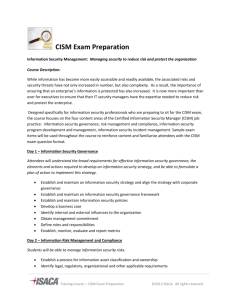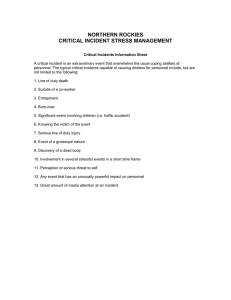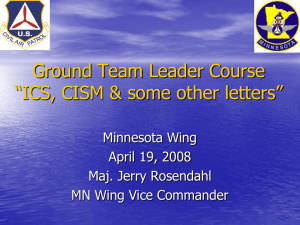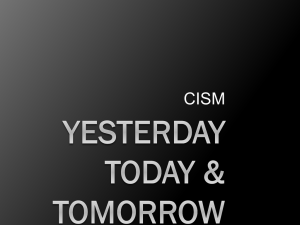CISM Guidelines for Fire Management June 2010
advertisement
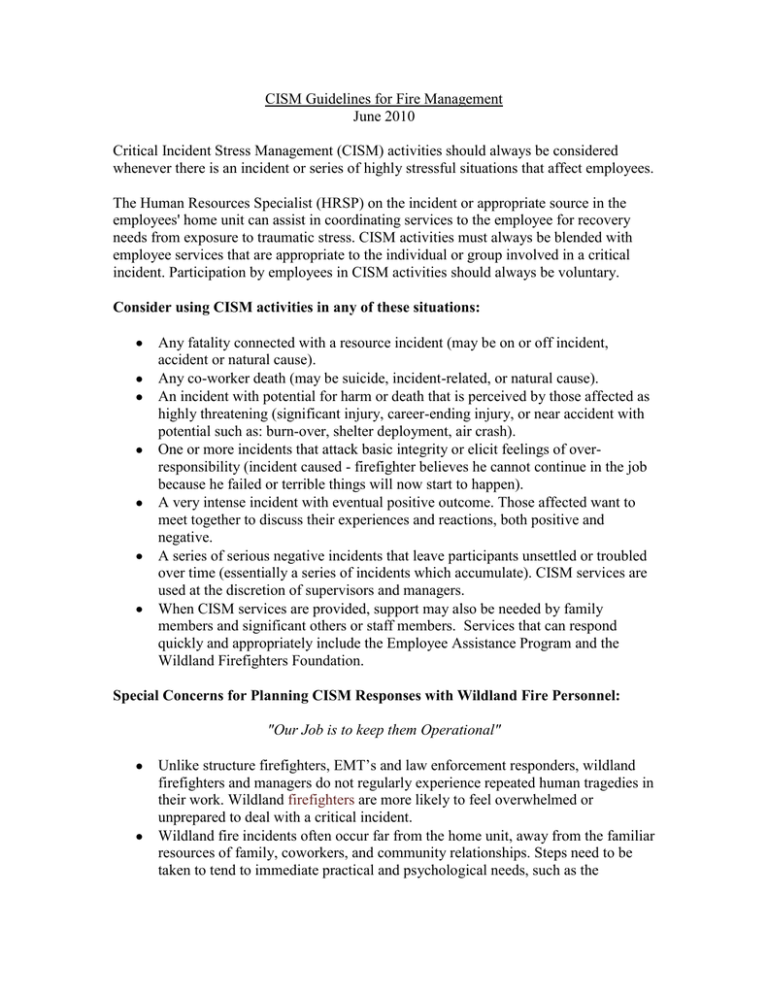
CISM Guidelines for Fire Management June 2010 Critical Incident Stress Management (CISM) activities should always be considered whenever there is an incident or series of highly stressful situations that affect employees. The Human Resources Specialist (HRSP) on the incident or appropriate source in the employees' home unit can assist in coordinating services to the employee for recovery needs from exposure to traumatic stress. CISM activities must always be blended with employee services that are appropriate to the individual or group involved in a critical incident. Participation by employees in CISM activities should always be voluntary. Consider using CISM activities in any of these situations: Any fatality connected with a resource incident (may be on or off incident, accident or natural cause). Any co-worker death (may be suicide, incident-related, or natural cause). An incident with potential for harm or death that is perceived by those affected as highly threatening (significant injury, career-ending injury, or near accident with potential such as: burn-over, shelter deployment, air crash). One or more incidents that attack basic integrity or elicit feelings of overresponsibility (incident caused - firefighter believes he cannot continue in the job because he failed or terrible things will now start to happen). A very intense incident with eventual positive outcome. Those affected want to meet together to discuss their experiences and reactions, both positive and negative. A series of serious negative incidents that leave participants unsettled or troubled over time (essentially a series of incidents which accumulate). CISM services are used at the discretion of supervisors and managers. When CISM services are provided, support may also be needed by family members and significant others or staff members. Services that can respond quickly and appropriately include the Employee Assistance Program and the Wildland Firefighters Foundation. Special Concerns for Planning CISM Responses with Wildland Fire Personnel: "Our Job is to keep them Operational" Unlike structure firefighters, EMT’s and law enforcement responders, wildland firefighters and managers do not regularly experience repeated human tragedies in their work. Wildland firefighters are more likely to feel overwhelmed or unprepared to deal with a critical incident. Wildland fire incidents often occur far from the home unit, away from the familiar resources of family, coworkers, and community relationships. Steps need to be taken to tend to immediate practical and psychological needs, such as the 2 opportunity to call home, an overnight stay in a motel, and the chance to be with others who shared experiences from the incident. Fire managers and firefighters are often fatigued or sleep-deprived due to long hours and poor sleeping conditions on extended fire suppression assignments. In planning CISM activities and other personnel services, consideration is given to providing opportunities for adequate rest along with other supports. Priority for CISM services may include more immediate defusing responses, and careful scheduling of debriefings no sooner than 24 hours after the incident. There is often a need for additional individual or group CISM services upon return home. Firefighters should be provided with water, food (at least a snack), and a way to call home before being asked to attend a defusing. The HRSP or a CISM team member can contact a chaplain if requested. When a Critical Incident Debriefing (CISD) is planned, personnel should be allowed to clean up and a night's rest prior to the meeting. Range of CISM Responses: CISM services can be one-on-one or with groups of people involved in the incident. The CISM team can be available to meet with people after an administrative debriefing about the incident. Activities can be flexible and used to meet each situation. "CISM Responds to the Employee’s Response to the Incident, and not to the Incident" Follow-up and Referral Employee Assistance Program (EAP) - Counseling services by EAP provide natural transitions from CISM activities to follow-up assistance for those still troubled by the incident. EAP follows the philosophy of CISM in helping normal people deal with abnormal situations in their lives. Referral for Therapy Incident Specific: Some people are so troubled by the incident they may require longer-term therapy and/or medication than CISM and 1-4 sessions of EAP can resolve. Previous Unresolved CIS Situations: Some people traumatized by unresolved tragedies and other critical incidents require professional assistance. Other Psychological Needs: Some have other psychological problems not caused by the critical incident, but worsened by one or more critical incidents. When referring people for therapy, it is important to inquire whether they are presently receiving professional treatment.
